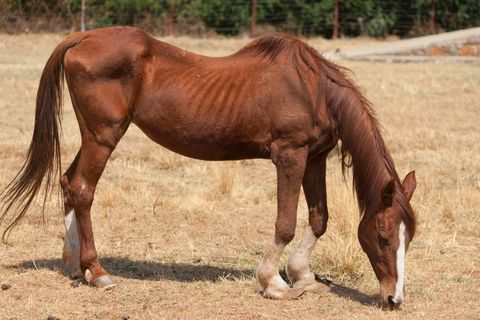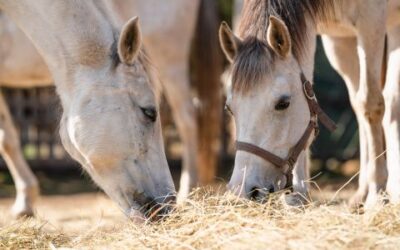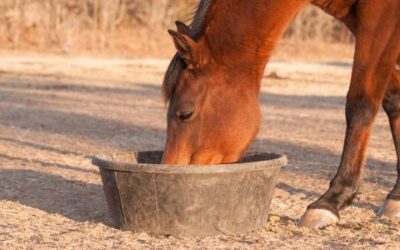
Have you ever owned or worked with underweight horses or a horse that was a “hard keeper”? A hard keeper refers to a horse who is consistently thin and has a difficult time gaining and maintaining weight. In this blog, we look at this topic with a forage-based approach to help you assist your horse in gaining weight and building muscle mass. Here’s what to know about caring for an underweight horse.
Before you modify your horse’s diet, it is imperative to ask yourself, “Is there an underlying medical condition?” Horses with dental issues, ulcers, high anxiety, or a high parasite load may have difficulty gaining or maintaining weight. It is essential to work with your veterinarian to ensure that your horse is healthy, especially if they have suddenly dropped weight without a change in workload, diet, or barn situation.
After you have assessed your horse’s health, body condition, and weight gain goals, you need to take a closer look at your feeding program and activity level. Before you start increasing your grain, you should ensure that your horse is meeting their forage requirements. Generally speaking, a horse should be eating a minimum of 1.25-1.5% of their body weight in forage each day. For horses on the thin side, aim to feed 2% of their body weight in forage. For horses with difficulty gaining weight, we recommend a forage that is higher in calories, such as alfalfas and alfalfa mix hays, like Timothy Plus Alfalfa horse feed. These hays have more calories per pound than other forages.
Ideally, horses that need to gain weight would have access to free-choice quality forage. In order to prevent excess waste, consider feeding the hay at consistent intervals during the day or keeping the hay elevated in a hay feeder or large bucket.
Increasing your horse’s caloric intake can be as simple as feeding more grain or more forage; however, you may need to supplement additional calories. Traditionally, horsemen have added corn oil as a source of extra calories. However, corn oil has been shown to have a low ratio of omega-three fatty acids to omega-six fatty acids. This high level of omega-six acids can cause an increase in inflammation.
Now, equine nutritionists and veterinarians recommend using a weight gain supplement. These supplements are available in liquid, powder, and pellet form, which makes them easy to encourage even the pickiest of eaters to indulge in them. Weight gain supplements contain concentrated fats that help your horse gain weight without adding bulk to their diets. Some products utilize soy oil and coconut for increased calories, while others use milled flax seeds. All of these sources provide the correct ratios of omega threes to omega sixes.
There’s a lot to know about caring for an underweight horse. Helping horses gain weight is a slow process, and you need to be realistic in your expectations and how long it will take your horse to achieve your desired results. Make sure you chronicle your horse’s progress with pictures and periodic body score condition checks to determine the success of your new feeding regime.




